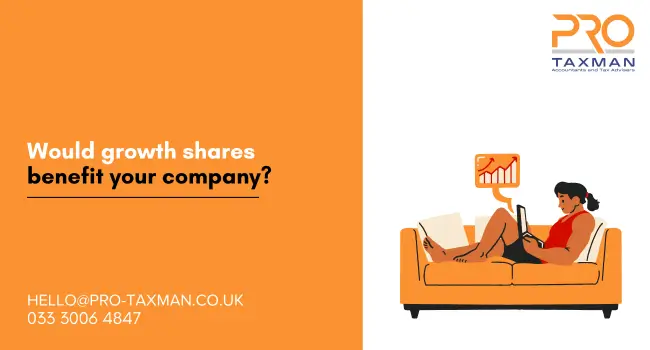Today’s business world is increasingly competitive. In order to survive and grow, a business needs to retain talented personnel. While benefits such as medical insurance are common in salary packages, many employers are finding that more is needed in order to attract or even retain good employees. One increasingly popular solution is the use of ‘growth’ shares, sometimes being used as an alternative where a company is not eligible to grant an Enterprise Management Incentive Plan (e.g. because the number of employees exceeds 250).
What are they?
Growth shares are not explicitly defined in any Companies House documentation. Such shares are a special class of ordinary shares created by a company to reward individuals (typically employees, directors or family members) but only if the company’s value exceeds a set threshold. This makes such shares an effective tool for incentivising key stakeholders (directors or employees) without diluting existing ownership too heavily or unnecessarily distributing value that has already been created. Typically, growth shareholders do not have a say in the company’s affairs.
A specific type of growth share called ‘flowering shares’ only benefits the shareholder if certain performance conditions are met (e.g. if the company achieves specific profit targets).
How growth shares work
When a company issues growth shares, it sets a ‘hurdle rate’, usually tied to a specific company valuation or a return on investment. The hurdle is usually set at a premium above the company’s market value at the time of issue. Only the increase in value above this hurdle is shared between the shareholders, ensuring that any value created before the shares were issued remains with the original shareholders and any new value isshared with those contributing to the company’s ongoing success.
Growth shares can be structured with various rights and restrictions. They typically do not come with voting rights, rights to dividends or capital until the hurdle is achieved and a liquidity event occurs(typically when the employee leaves or the company itself is sold). The employer can also impose performance or other conditions on the employee’s retention of their growth shares.
Tax implications
The tax treatment of growth shares for employees depends on whether the shares are acquired at market value or at a discount.
If granted at full market value, there are generally no income tax or NIC implications for either the employee or employer; this is because the shares will initially hold little value, reflecting the fact that they will only gain value if the company grows. If the shares are issued at a discount, the discount is usually treated as employment income.
When the shares are eventually sold, any increase in value is subject to capital gains tax (CGT). The tax rate will be at the usual CGT rates of 18% (basic rate taxpayer) or 24% (higher and additional rate taxpayers) unless Business Asset Disposal Relief (BADR) can be claimed which reduces the tax rate to 14% for disposalsin 2025/26 and 18% after 6 April 2026.
There are various conditions attached to BADR:
- The company must be a trading company.
- The shareholder must be a director (or employee) of the companywhose share are being sold.
- During the period of a minimum of two years before sale, the shares held represented at least 5% of the nominal value of the company’s ordinary share capital and 5% of the voting rights in the company.
- The shareholder must also be entitled to at least 5% of either (i) the profits available for distribution and assets on winding up the company or (ii) disposal proceeds if the company is sold.
HMRC’s view
HMRC’s view is that growth shares should be realistically valued and not just assumed to be nil simply because there is a ‘hurdle’ to overcome. The hurdle must be genuinely higher than the current market value, and any discounts justifiable. HMRC maintains a cautious stance regarding discounts and usually only accepts modest ones that are objectively justified.
Practical point
HMRC will require a formal valuation before such growth shares can be issued and the company’s articles of association may have to be amended. Also, a subscription agreement must be signed.
Need professional accounting service or tax advice? Contact us to book a 15-min Free Consultation with us today.
To find out more please follow us on Facebook, Instagram, or LinkedIn. Feel free to contact us on 0333 006 4847 or request a call back by texting 075 6464 7474

